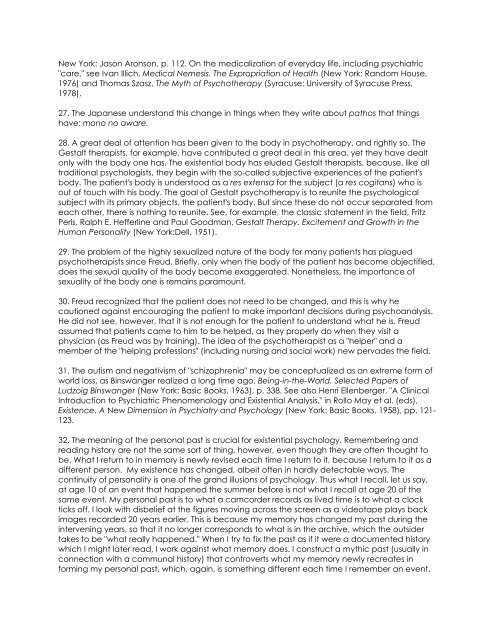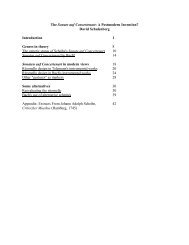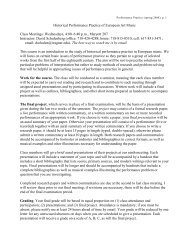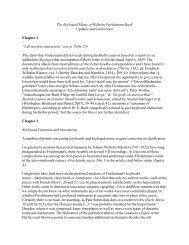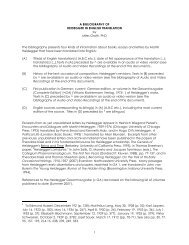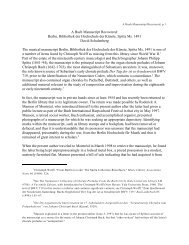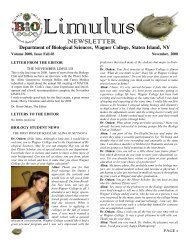SEVEN PAPERS ON EXISTENTIAL ANALYSIS ... - Wagner College
SEVEN PAPERS ON EXISTENTIAL ANALYSIS ... - Wagner College
SEVEN PAPERS ON EXISTENTIAL ANALYSIS ... - Wagner College
You also want an ePaper? Increase the reach of your titles
YUMPU automatically turns print PDFs into web optimized ePapers that Google loves.
New York: Jason Aronson, p. 112. On the medicalization of everyday life, including psychiatric<br />
"care," see Ivan Illich, Medical Nemesis. The Expropriation of Health (New York: Random House,<br />
1976) and Thomas Szasz, The Myth of Psychotherapy (Syracuse: University of Syracuse Press,<br />
1978).<br />
27. The Japanese understand this change in things when they write about pathos that things<br />
have: mono no aware.<br />
28. A great deal of attention has been given to the body in psychotherapy, and rightly so. The<br />
Gestalt therapists, for example, have contributed a great deal in this area, yet they have dealt<br />
only with the body one has. The existential body has eluded Gestalt therapists, because, like all<br />
traditional psychologists, they begin with the so-called subjective experiences of the patient's<br />
body. The patient's body is understood as a res extensa for the subject (a res cogitans) who is<br />
out of touch with his body. The goal of Gestalt psychotherapy is to reunite the psychological<br />
subject with its primary objects, the patient's body. But since these do not occur separated from<br />
each other, there is nothing to reunite. See, for example, the classic statement in the field, Fritz<br />
Perls, Ralph E. Hefferline and Paul Goodman, Gestalt Therapy. Excitement and Growth in the<br />
Human Personality (New York:Dell, 1951).<br />
29. The problem of the highly sexualized nature of the body for many patients has plagued<br />
psychotherapists since Freud. Briefly, only when the body of the patient has become objectified,<br />
does the sexual quality of the body become exaggerated. Nonetheless, the importance of<br />
sexuality of the body one is remains paramount.<br />
30. Freud recognized that the patient does not need to be changed, and this is why he<br />
cautioned against encouraging the patient to make important decisions during psychoanalysis.<br />
He did not see, however, that it is not enough for the patient to understand what he is. Freud<br />
assumed that patients came to him to be helped, as they properly do when they visit a<br />
physician (as Freud was by training). The idea of the psychotherapist as a "helper" and a<br />
member of the "helping professions" (including nursing and social work) new pervades the field.<br />
31. The autism and negativism of "schizophrenia" may be conceptualized as an extreme form of<br />
world loss, as Binswanger realized a long time ago. Being-in-the-World. Selected Papers of<br />
Ludzoig Binswanger (New York: Basic Books, 1963), p. 338. See also Henri Ellenberger, "A Clinical<br />
Introduction to Psychiatric Phenomenology and Existential Analysis," in Rollo May et al. (eds),<br />
Existence. A New Dimension in Psychiatry and Psychology (New York: Basic Books, 1958), pp. 121-<br />
123.<br />
32. The meaning of the personal past is crucial for existential psychology. Remembering and<br />
reading history are not the same sort of thing, however, even though they are often thought to<br />
be. What I return to in memory is newly revised each time I return to it, because I return to it as a<br />
different person. My existence has changed, albeit often in hardly detectable ways. The<br />
continuity of personality is one of the grand illusions of psychology. Thus what I recall, let us say,<br />
at age 10 of an event that happened the summer before is not what I recall at age 20 of the<br />
same event. My personal past is to what a camcorder records as lived time is to what a clock<br />
ticks off. I look with disbelief at the figures moving across the screen as a videotape plays back<br />
images recorded 20 years earlier. This is because my memory has changed my past during the<br />
intervening years, so that it no longer corresponds to what is in the archive, which the outsider<br />
takes to be "what really happened." When I try to fix the past as if it were a documented history<br />
which I might later read, I work against what memory does. I construct a mythic past (usually in<br />
connection with a communal history) that controverts what my memory newly recreates in<br />
forming my personal past, which, again, is something different each time I remember an event.


